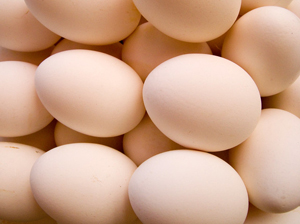As consumer demand for organic food continues to rise, many corporations that previously only marketed conventional food have thrown their hats into the ring. While they claim to be making organic food more widely available, the effects of their vertically integrated supply chains and lobbying efforts to stretch the organic regulations have had catastrophic effects on real organic farmers.
 |
For instance, 80% of the organic eggs now on the market come from factory “organic” henhouses. The birds are offered screened porches in lieu of real outdoor access–relying on the argument that this protects them from disease. In fact, our investigations suggest that hens granted legitimate outdoor access rarely succumb to the kinds of disease that can wreak havoc in giant operations.
While the eggs from these industrial producers are a step above conventional eggs, they cannot match the value of truly organic eggs—to the eater, the hen, the farmers, and the environment.
The BBC program, The Food Chain, takes a look at the corporatization of “organic” from the perspective of experts in India, the Netherlands, and the U.S. The Real Organic Project’s Dave Chapman was interviewed for this episode and observes: “It’s not a given in my mind that big is bad, it’s just that when big is bad, it’s very bad.”
Organic Inc
BBC, The Food Chain
At heart, the organic movement is driven by ethics, not market-forces. It started out as a reaction to large-scale industrial agriculture, with an anti-establishment vibe which abhorred mass produced, processed food. But, as demand for organic products has grown, big business has moved in, and now accounts for an increasing amount of the market.
Big Food has money and clout. It can support farmers to transition to organic, and throw its weight behind marketing the virtues of organic methods and food. But whilst its products might be organic on paper, has it truly embraced the spirit of the movement, and does that matter?
Emily Thomas talks to three organic farmers who are uneasy about ‘Big Organic’, and General Mills, one of the largest food producers in the US.

